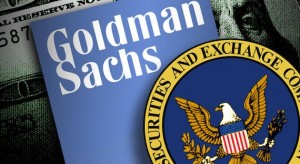Late Thursday, in the aftermath of final passage of the Financial Takeover bill, it was announced that Goldman Sachs would pay a $550 million settlement fee to the Securities and Exchange Commission in the civil suit where the SEC charged Goldman Sachs with fraud. Oddly, this settlement seems to be accepted widely instead of drawing criticism that this may have been simple extortion.
This is not to say that Goldman Sachs did not defraud its customers into selling mortgage securities in order to strike it rich on the housing market collapse. Rather, we will never know if that is what happened or not.
Considering that the SEC levied these charges, which are very serious, in an effort to stop and expose bad practices, one would assume that the SEC would carry these charges through the Court system until a verdict was reached. Alleging that a party had committed acts of fraud is serious. And these types of actions should be investigated. But to walk away from charges, albeit $550 million ahead, is cause enough for suspicion to rise.
One must wonder if the SEC was serious about its allegations. While $550 million is no small sum, excluding the fact that the amount of the settlement was the equivalent of two weeks’ profit for Goldman in the first quarter of 2010, one must wonder if this was a shakedown committed by the SEC.
Of the few powers granted to Government in the Constitution, one is to provide a justice system which protects the rights of the people and the rights of the accused. If the government can levy charges against a corporation, then reach a settlement in which the government is awarded money without determining if there was any wrongdoing, then justice has not been reached. If the government does not proceed with the case, dropping the charges in exchange for money, then why were charges brought forth in the first place. One would usually assume that charges were brought forth in order to stop wrongdoing.
However, the governments dropping of the case raises one to question if the case was brought forth in good faith? Many Washington insiders question if the case was brought forth to coincide with Obama’s financial reform agenda. By dropping the case, the government does not engage in the discovery process thus leaving the questions of government timing and motives unanswered. Was this civil case simply a way for the government to hustle money from an organization they claim misled their customers without providing proper information on investments?
Clearly it was in Goldman Sachs’s best interest for the case to go away. Having such high-level law suits on their hands is troublesome enough. But what does America learn from this charade?
It is clear that the government did not want to proceed with their charges. It is also clear that they prospered significantly from their accusations. But where is the justice? This smells like crony capitalism.
In an age where distrust of government is at an all-time high, one would assume that the government bureaucracies that are charged with providing regulation to the financial markets would act responsibly now more than ever. Clearly, in the case of the $550 million settlement with Goldman Sachs, someone at the SEC was very afraid that their actions would be subjected to scrutiny in a court of law. This just goes to show that handing more power to the government to investigate the actions of Wall Street power brokers only results in shakedowns, a lack of justice, and a lack of transparency.
If the government wants to bring a case against a corporation or labor union, they should be required to see it through the court system in order to provide certainty to the American public that they are not engaging in legal extortion. This is the least that we should expect from them.







